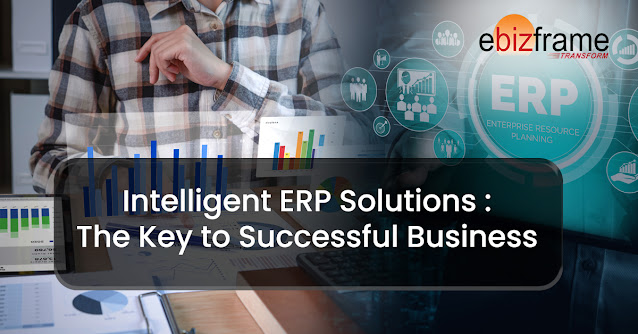Enhancing Patient Care through ERP for Healthcare Industry
Benefits of Integrated ERP for Healthcare Industry
- Streamlined Workflows and Improved Efficiency: One of the main benefits of implementing ERP for Healthcare Industry is the streamlining of workflows and improved efficiency. An integrated ERP system enables healthcare organizations to automate routine tasks such as patient registration, appointment scheduling, billing, and claims processing. This automation saves time, reduces errors, and allows healthcare professionals to focus on providing quality care to patients.
- Enhanced Patient Care and Safety: Integrated ERP systems provide healthcare professionals with easy access to patient information, enabling them to make informed decisions quickly. With a centralized system, doctors can access a patient's medical history, medications, and allergies, allowing for more accurate diagnoses and treatment plans. This seamless access to information improves patient care and safety, leading to better health outcomes.
- Improved Inventory and Supply Chain Management: ERP systems in the healthcare industry also offer robust inventory and supply chain management capabilities. Healthcare organizations can optimize inventory levels, reduce waste, and ensure timely delivery of medical supplies by integrating these processes into a single system. This efficient management of resources helps them avoid stock outs and reduces costs associated with overstocking.
- Data-driven Decision Making: An integrated ERP system provides healthcare organizations with real-time data and analytics, enabling administrators to track key performance indicators (KPIs) such as patient outcomes, budgeting, and resource utilization. This data empowers informed decision-making, allowing organizations to identify areas for improvement, allocate resources effectively, and optimize their operations.
- Simplified Compliance and Reporting : Compliance with regulations and reporting requirements is a critical aspect of the healthcare industry. Integrated Healthcare ERP System provides organizations with tools to simplify compliance by automating processes and generating accurate reports. These systems ensure that organizations adhere to industry standards and can easily demonstrate compliance during audits.
- Secure and Confidential Data Management : Data security and patient confidentiality are of utmost importance in the healthcare industry. ERP for Healthcare Industry offer robust security measures and access controls, ensuring that sensitive patient information is protected. Healthcare organizations can safeguard patient privacy by limiting data access to authorized individuals with role-based access privileges.
Related Blogs:
Key Features of Healthcare ERP Systems
- Automation : Healthcare ERP systems automate routine tasks, such as patient registration, appointment scheduling, billing, and claims processing. This automation reduces manual errors, saves time, and improves operational efficiency.
- Integration : ERP for Healthcare Industry integrate with other healthcare applications, such as Electronic Health Records (EHRs) and practice management systems. This integration enables seamless data flow between different departments and eliminates the need for manual data entry.
- Tracking and Visibility : Healthcare ERP systems provide real-time tracking and visibility into key performance metrics, such as patient outcomes, inventory levels, and financial performance. This feature allows healthcare organizations to monitor their operations closely and make data-driven decisions.
- Patient Portals and CRM: ERP for Healthcare Industry often include patient portals and Customer Relationship Management (CRM) tools. These features enhance patient engagement and enable patients to schedule appointments, access medical records, and communicate with healthcare professionals.
- Supply Chain Management (SCM) : Healthcare ERP systems offer comprehensive supply chain management features, allowing organizations to manage inventory, track supply chain movements, and automate procurement processes. This feature helps reduce costs, optimize inventory levels, and improve supply chain efficiency.
- Financial Management: ERP for Healthcare Industry include financial management features such as accounting, billing, and financial reporting. These features help healthcare organizations efficiently manage their finances and make informed financial decisions.
- Sales and Marketing: Healthcare ERP systems often include sales and marketing features such as lead management, marketing campaigns, and customer relationship management. These features help healthcare organizations attract new patients, retain existing patients, and improve patient satisfaction.
- Human Resources: Healthcare ERP systems provide comprehensive human resources features, including payroll management, benefits administration, and employee performance tracking. These features help healthcare organizations effectively manage their workforce and improve employee satisfaction.
- Reporting and Analytics : ERP for Healthcare Industry offer powerful reporting and analytics capabilities, enabling organizations to generate reports, analyze data, and gain insights into their operations. These features help healthcare organizations measure performance, identify trends, and make data-driven decisions.
- Clinical Decision Support : Healthcare ERP systems often include clinical decision support features that assist healthcare professionals in making informed decisions based on patient data, clinical guidelines, and best practices. This feature enhances patient outcomes and improves the quality of care.
Challenges in the Healthcare Industry
- Ever-increasing Healthcare Costs : The healthcare industry faces the challenge of rising costs, including increasing drug prices, technological advancements, and the cost of treating chronic diseases. ERP systems can help healthcare organizations optimize their operations, reduce costs, and improve financial performance.
- Payment Processing and Invoicing : Payment processing and invoicing are complex tasks in the healthcare industry due to the intricacies of insurance claims and billing processes. ERP for Healthcare Industry can simplify payment processing and invoicing by automating financial processes and providing real-time data insights.
- Growing Pharmaceutical Prices : The healthcare industry grapples with growing pharmaceutical prices, which can impact the overall cost of patient care. ERP systems can help healthcare organizations manage their supply chain more efficiently, reducing costs associated with pharmaceutical purchases.
- Regulatory Changes and Compliance : Healthcare organizations must stay compliant with changing regulations and standards, which can be a challenging task. ERP for Healthcare Industry simplify compliance by providing guidance on upcoming regulations and automating processes to ensure compliance.
- Staffing Shortages : Healthcare organizations often face staffing shortages, which can impact patient care and operational efficiency. ERP for Healthcare Industry can help organizations manage their workforce more effectively by automating recruitment processes and providing data insights for workforce planning.
- Organizational Problems : Organizational problems, such as communication gaps and inefficient workflows, can hinder the delivery of quality patient care. ERP for Healthcare Industry helps organizations improve communication and collaboration across departments, streamlining workflows and enhancing organizational efficiency.
- Cybersecurity and Data Protection : Data security and protection of patient information are critical in the healthcare industry. Healthcare ERP systems offer robust security measures to safeguard sensitive data and protect against cybersecurity threats.
How ebizframeRx can Help Your Healthcare Business
Our ebizframeRx suite offers a comprehensive array of specialized modules designed for hospitals, medical colleges, clinics, and diagnostic centers. These modules cover various aspects, including patient registration, pharmacy management, purchase and stores, and more. With ebizframeRx, you can streamline administrative, operational, revenue, and clinical workflows within your healthcare facility.
One of the key features of ebizframeRx is its Management Information System (MIS) module. This module provides precise tracking and management of various variables across all HIMS modules, empowering your healthcare facility with accurate insights and data-driven decisions.
At Eastern Software Systems, we understand the challenges faced by healthcare organizations and the importance of flexibility and user-friendliness in Healthcare ERP systems. Our solutions are designed to meet the unique requirements of the healthcare industry, ensuring swift implementation and tangible benefits for your organization. With our expertise in the Healthcare industry, we can help you transform your healthcare management and enhance patient care.
Conclusion
In conclusion, Healthcare ERP Systems offer significant benefits for the healthcare industry, including streamlined workflows, improved efficiency, enhanced patient care, and simplified compliance. Implementing an ERP system tailored to the specific needs of your healthcare organization can optimize your operations, reduce costs, and provide better patient outcomes. The ebizframeRx suite enables you to leverage a comprehensive ERP solution designed to transform your healthcare management and enhance patient care.
For further insights into how ebizframeRx can enhance patient care, please reach out to us today at marketing@ebizframe.com or visit www.ebizframe.com. Our team of digital transformation experts is ready to guide you toward achieving streamlined operations for your business.




Comments
Post a Comment